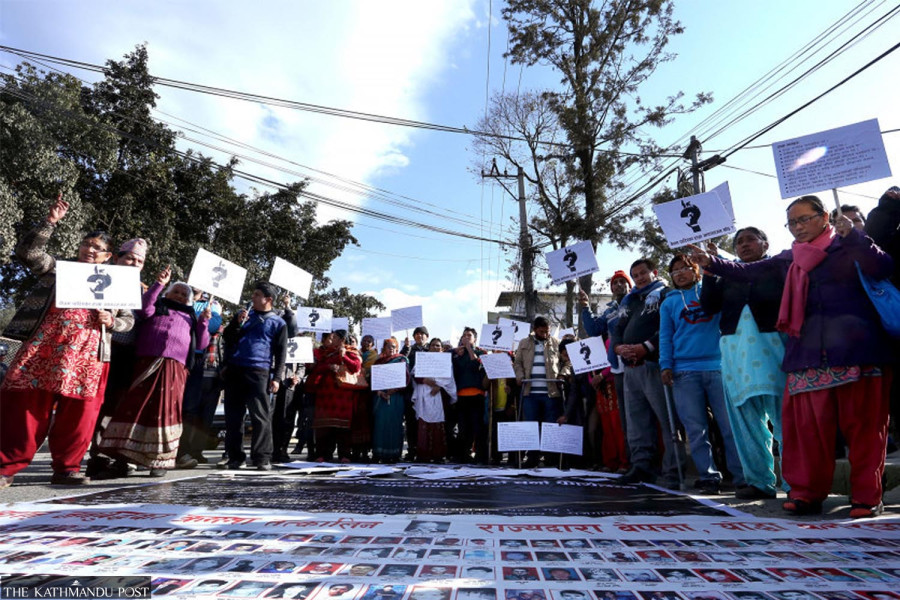National
Victims object to proposed changes in laws that aim to absolve perpetrators
There’s demand for withdrawal of the bill registered in parliament secretariat to amend the transitional justice Act so as to make it in line with the 2015 Supreme Court order.
Binod Ghimire
Around seven dozen organisations representing the victims of the insurgency have demanded that the Ministry of Law and Justice withdraw its bill to amend the Commission of Inquiry on Enforced Disappeared, Truth and Reconciliation Commission Act 2014 from the parliament secretariat, expressing their reservations over a number of provisions.
Issuing separate statements, 41 organisations of the conflict victims and 39 organisations advocating human rights on Wednesday demanded a revision to the “problematic provisions” that they say are aimed at granting amnesty to the perpetrators even in the cases of serious violation of human rights.
They have demanded that the bill be withdrawn and reintroduced by making it compatible with the 2015 verdict of the Supreme Court and international practices.
The conflict victims’ organisations have said the ministry has failed to incorporate most of their suggestions made during several consultations with the government. Prior to drafting the bill, the ministry had held several rounds of consultations with the victims and civil society organisations for their feedback and promised to incorporate them in the bill.
The victims’ groups say most of their suggestions were ignored. “The government has betrayed and deceived the conflict victims by not incorporating most of the suggestions made during the provincial and central consultations,” reads their statement. “It seems the bill was introduced to serve the perpetrators with a larger goal to grant them amnesty in all cases.”
The victims and human rights organisations have expressed their reservations over the list of the non-amnestiable crimes in the bill. The bill says “cruel murder” or murder after torture, rape, enforced disappearances and inhumane or cruel torture committed against the unarmed or common people during the insurgency are serious human rights violations which are non-amnestiable. It, however, doesn’t list war crimes and crimes against humanity under serious human rights violations.
The bill has opened door for amnesty for murder by saying only “cruel murder” will be non-amnestiable, thus providing a loophole to define all murders as non-cruel, thereby, allowing amnesties in all the murders, according to their statements.
“The clause that there will be no amnesty for the rape of unarmed or common people means there could be amnesty if the rape victims are armed combatants,” reads the statement issued by conflict victims. “The provision contradicts international law and the Supreme Court’s verdict.”
The perpetrators are prosecuted based on the recommendations from the Truth and Reconciliation Commission and the Commission of Investigation on Enforced Disappeared Persons. However, it doesn’t envision any investigation units under the commission which the victims and human rights organisations say is problematic.
The Attorney General’s Office bears the authority to file the cases in the Special Court to be formed to hear the insurgency-era cases as per the bill. On the recommendation from the transitional justice commissions, the office has to file cases against the alleged perpetrators within six months. However, the victims’ groups say six months is too long a time when the bill envisions a tenure of maximum of two years for the commissions themselves.
As per the bill, the decision of the Special Court will be final with no provision of filing appeal in the Supreme Court. The victims’ organisations also have demanded a revision to the bill saying it contradicts Article 128 of the Constitution of Nepal, which says all the courts are under the Supreme Court and it has authority to hear the appeal of the decision made by lower courts.
The bill envisions prosecuting serious violations of human rights based on the Penal Code that came into force in 2018. Enforced disappearances and torture were criminalised for the first time by the code. However, the code doesn’t have retrospective jurisdiction which means the crimes committed before 2018 cannot be prosecuted under it. Conflict victims say the code does not cover for crimes committed during the insurgency.
Similarly, the provisions of the statute of limitations in the code would also prevent the prosecution for insurgency-era cases of human rights violations. For instance, the statute of limitations for filing rape cases is up to three years.
It will not be possible to bring prosecutions for insurgency-era rape cases without amending the Penal Code, reads the statement from the victims’ group.
Conflict victims say they had high hopes from the government this time because Govinda Sharma Bandi, who had fought for the victims for years, is the law minister. “However, the bill has shattered our dreams. We are not going to accept it at any cost,” Maina Karki, chairperson of the Conflict Victims Common Platform whose husband was killed by the Maoists in 2004, told the Post. “We will start protesting if the government pushes the bill without revision.”
Similarly, human rights organisations have said despite having positive measures, the amendment bill contains many provisions that violate the victims’ right to an effective remedy. “The categorisation of rights violations in the bill is not acceptable. Earnest efforts are required from the government and the political parties to prevent explicit or implicit immunity from criminal accountability for those involved in serious violations of human rights and intentional crimes,” reads their statement.
“The ministry must re-work the bill to ensure that it complies with national and international laws, decisions of the Supreme Court of Nepal, and the aspirations expressed by victims during the consultations.”
The bill that was registered at the parliament secretariat on Friday was supposed to be presented in parliament on Wednesday. However, the plan was rolled back following the controversies and thus leaving the fate of the bill uncertain. “The bill will move ahead based on the priority of the parliament,” Bandi, the law minister, told the Post.




 20.53°C Kathmandu
20.53°C Kathmandu















